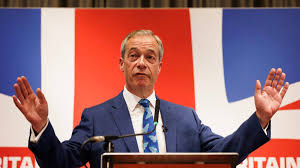
Breaking News
 Dr David Martin - I'm done being polite
Dr David Martin - I'm done being polite
 Palantir Wants to Be a Lifestyle Brand
Palantir Wants to Be a Lifestyle Brand
 Britain Is Manifesting Nigel Farage as Its Next Prime Minister
Britain Is Manifesting Nigel Farage as Its Next Prime Minister
 Max Blumenthal: Charlie Kirk's Story FALLS APART
Max Blumenthal: Charlie Kirk's Story FALLS APART
Top Tech News
 This "Printed" House Is Stronger Than You Think
This "Printed" House Is Stronger Than You Think
 Top Developers Increasingly Warn That AI Coding Produces Flaws And Risks
Top Developers Increasingly Warn That AI Coding Produces Flaws And Risks
 We finally integrated the tiny brains with computers and AI
We finally integrated the tiny brains with computers and AI
 Stylish Prefab Home Can Be 'Dropped' into Flooded Areas or Anywhere Housing is Needed
Stylish Prefab Home Can Be 'Dropped' into Flooded Areas or Anywhere Housing is Needed
 Energy Secretary Expects Fusion to Power the World in 8-15 Years
Energy Secretary Expects Fusion to Power the World in 8-15 Years
 ORNL tackles control challenges of nuclear rocket engines
ORNL tackles control challenges of nuclear rocket engines
 Tesla Megapack Keynote LIVE - TESLA is Making Transformers !!
Tesla Megapack Keynote LIVE - TESLA is Making Transformers !!
 Methylene chloride (CH2Cl?) and acetone (C?H?O) create a powerful paint remover...
Methylene chloride (CH2Cl?) and acetone (C?H?O) create a powerful paint remover...
 Engineer Builds His Own X-Ray After Hospital Charges Him $69K
Engineer Builds His Own X-Ray After Hospital Charges Him $69K
 Researchers create 2D nanomaterials with up to nine metals for extreme conditions
Researchers create 2D nanomaterials with up to nine metals for extreme conditions
Britain Is Manifesting Nigel Farage as Its Next Prime Minister

Nigel Farage's Reform U.K. Party - the latest incarnation of the right-wing, anti-immigrant political movement that he has led for twenty years - has been atop the British polls for the past six months. It is currently polling at thirty per cent, ten points ahead of the Labour government. If there were a general election tomorrow, there is a plausible chance that Reform would win hundreds of seats in the House of Commons; that the duopoly of Labour and the Conservatives, which has ruled British politics for a century, would be broken; and that Farage, once nicknamed Mr. Brexit by his friend Donald Trump, would be Prime Minister.
There are plenty of sane, sensible arguments for why this won't happen. For one thing, according to the law, there doesn't need to be a general election until the summer of 2029. But British politics haven't been sane or sensible for a long time—since Brexit, really, the last time that Farage jolted the country's traditional two-party system off the rails. So, instead of looking upon the rise of Reform with resolve or equanimity (the Party currently has five members of Parliament, less than one per cent of the total), everyone is losing their mind. Whether out of shock, revulsion, or genuine affection—according to the polling firm YouGov, Farage is the most popular politician in the country—all that anyone can talk about is the unthinkable possibility of a Reform government, thus making it more thinkable by the day. The political center, occupied by Keir Starmer's Labour Party and what remains of the moderate wing of the Conservative Party, is the most morbidly mesmerized of all. Watching mainstream British politicians obsess over the threat of Farage is a bit like watching the video on the internet of the guy standing motionless on the beach in Thailand, the water draining around his ankles, waiting for the tsunami to arrive.



